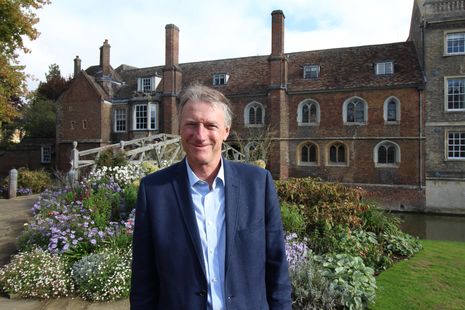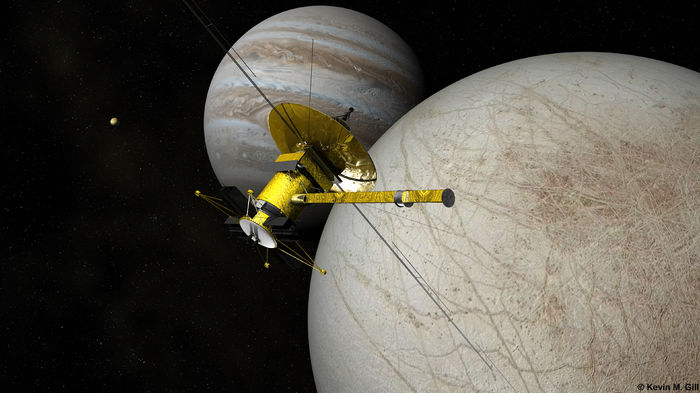Astronaut Dr. Michael Foale’s stellar career
The internationally-celebrated astronaut reveals to Orla McMahon how a punting trip down the river Cam opened the door to NASA

Michael Foale was seven years old the first time he ever saw a space rocket. Staring up wide-eyed at what he now describes as a rickety “dinosaur vehicle,” that young boy likely had no idea that he would one day become one of the world’s most celebrated astronauts, currently holding the British record for cumulative space time. Sitting down with me, Dr Foale is well-mannered and cheery, beaming with the subtle confidence of a man who has achieved his lifetime ambitions. But his journey towards this point has been no easy feat.
Though as a young child Foale had experimented with the idea of pursuing other careers (he confesses, laughing, that he had “considered being a steam engine driver”), it seems that from the age of 15 he had settled his mind on spaceflight. An avid lover of both science-fiction and algebra, Foale set his dreams on reaching space – dreams that were almost squashed as a teenager when he was rejected from the RAF due to purported eyesight complications. Reflecting upon one teary eyed payphone call to his father, Foale confesses that from this point he “thought it was over” for his career as an astronaut.
“Personal training at NASA was really easy compared to doing a degree at Cambridge!”
Luckily for Foale, this rejection marked a new beginning rather than an end, and after passing through “one of the hardest interviews he ever had” in order to secure his place reading Physical Natural Sciences at Queen’s College, Cambridge, he remembers hearing an advertisement for scientist astronauts. For him this was “like a light bulb moment”, and from this point onwards the young man had committed himself to his studies, explaining later that “personal training at NASA was really easy compared to doing a degree at Cambridge!”
However, in the midst of these youthful hopes and lofty dreams, tragedy tore its way through the fabric of Foale’s life, as he reveals that what “really drove [him] beyond” whilst studying for his postgraduate degree in astrophysics was the death of his brother and girlfriend in a horrific car accident. During a drive through summertime Yugoslavia in a British car, Foale told me that whilst behind the wheel a lorry swerved into the group, killing the passengers on the left-hand side. Somewhat murmuring, Foale bravely concedes that he “struggled with a lot of guilt problems”; the shock, he says, “stayed with [him] for decades.”
In the midst of his unspeakable loneliness, he expresses gratitude for those who supported him. Reflecting on a trip out to Wales with his professor Dr John Green and sessions where he coached him through challenging mathematics, Foale suggests that the human compassion from those around him allowed him to survive the rest of his time at Cambridge. The companionship of Stephen Fry’s drinking society – affectionately nicknamed ‘The Cherubs’ – was another place he found solace. But above all, Foale said that because he “couldn’t find anyone to replace his girlfriend Catherine” he “just completely buried himself in the physics”, and finished his postgraduate course within the prescribed three years.
“astral projections, the milky way, lightning flittering around the edges of black holes the sight of moonlight shining off of the Ocean”
On getting into NASA, Foale took an unconventional route to the organisation. As part of his first business venture, an undergraduate Foale had established an informal punting company with his pal one summer, where he served strawberries and cream to willing tourists. Through laughter, he tells me that “of course it was all violating health and the safety and got shut down in two weeks.” However, it was in this unusual context that he had his first encounter with the space programme, as he tells me that one day an American customer had admitted to working on the space shuttle – a revelation that shook the aspiring space cadet like thunder. “I almost fell of the punt!” he exclaims. It was this contact years later that would allow Foale an inside link, and the young man went to work later within mission control at NASA.
It was not until 1987 at 30 years old that Foale was eventually selected as as an astronaut. After a few years of personal training and eager anticipation, Foale finally made it to space. When asked how he felt looking out, he professes that he was “stunned by the beauty of it”. In elaborate detail he paints a picture of his view of astral projections, the milky way, lightning flittering around the edges of black holes, the sight of moonlight shining off of the Ocean, and the view of Earth at night lit up by city lights. Agreeing that he was something of a romanticist in his propensity towards gazing outwards “at every spare moment”, he would often reflect upon the possibility of life beyond Earth. Foale, though not a religious person, suggests that his time outside of the planet made him “incredibly aware of humanity” and caused him to appreciate the wonder of Earth.
Giving an account of his legendary experience working with the Russians for a 1997 space mission onboard Mir (an originally Soviet space station that operated from 1986 to 2001), Foale remarks upon the peculiarity of the situation he found himself in. Something of a first-hand witness to history, he explains his incredulity regarding the changes to US-Russian relations seen throughout his life, recounting how his “father had worked as an RAF pilot during the Cold War, when the organisation had planes geared with nuclear weapons towards the USSR”. Living in Star City enabled the astronaut to learn the Russian culture and language, something that made him popular amongst his crewmates whilst in space. Jovially, he recounts his experience fixing toilets (eliminating the source of a mysterious “space rash” onboard), growing broccoli, and measuring the circadian rhythm of beetles as part of his time onboard.
“Even though you had these profoundly different perspectives […] you can still manage to get along on a personal level”
It was on this mission that Foale came once more into the clutches of danger. Recounting the infamous collision that occurred onboard the Mir, Foale communicates how a hole ripped in the spacecraft, creating depressurisation and a major loss of oxygen.“I fully expected to die”, Foale recounts candidly. In these moments of what some might imagine as dizzying fear, for Foale “there was no panic,” completing the necessary tasks to try and save the team. After four hours of power outage, he explains how the crew had discussed the creation of a cunning plan to stop the tumbling of their craft by firing thrusts to stop their spinning. It worked, and all astronauts onboard endured to tell the tale.
And yet, despite the challenges faced upon his time on Mir, Foale remains far from cynical, being thankful that he “learnt another culture, another point of view” as a result of his time working within an international space crew. Further projects, including six months commanding the International Space Station with cosmonaut Alexander Kaleri, allowed Foale to come to the realisation that “even though you had these profoundly different perspectives politically, culturally and even in your understanding of the past, you can still manage to get along on a personal level”.
Though he reflects wistfully upon the loss of this connection in recent years amidst deteriorating relations with Russia, Foale remains on optimist regarding the future of inter-cultural space flight. Explaining to me that space travel in the coming years is likely to become much more frequent and more ambitious, he remains staunch advocate for the continuation of the ISS. Furthermore, he urges Cambridge students to get involved in space, arguing that the actualisation of your dreams is not as impossible as you may believe.
 News / Deborah Prentice overtaken as highest-paid Russell Group VC2 February 2026
News / Deborah Prentice overtaken as highest-paid Russell Group VC2 February 2026 Fashion / A guide to Cambridge’s second-hand scene2 February 2026
Fashion / A guide to Cambridge’s second-hand scene2 February 2026 News / Downing Bar dodges college takeover31 January 2026
News / Downing Bar dodges college takeover31 January 2026 Comment / College rivalry should not become college snobbery30 January 2026
Comment / College rivalry should not become college snobbery30 January 2026 Lifestyle / Which Cambridge eatery are you?1 February 2026
Lifestyle / Which Cambridge eatery are you?1 February 2026









